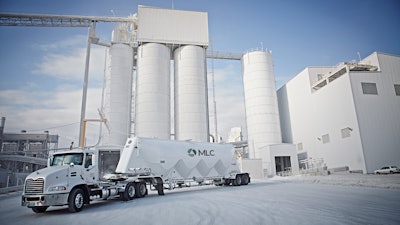
Calcium hydroxide and calcium oxide — also known by the catch-all name “lime” — are direct additives for foods and beverages, where they supplement calcium, adjust pH, bind ingredients, enhance texture and flavor and nixtamalize corn. Lime is also a building block in synthesis of preservatives and flow conditioners.
Manufacturers face simultaneous operations and supply chain challenges when sourcing lime. Manufacturers often experience risks with maintaining the right inventory levels and reliable logistics, while fulfilling consumer expectations and demand.
Lime supply can directly impact uptime, profitability, efficiency and sustainability. Strong supply partnership can provide confidence in a reliable, consistent, cost-effective and high-quality supply. Here are five ways companies can ease sourcing challenges and reduce risk through effective lime partnership.
Maintain quality
Calcium quality significantly impacts end-product quality. An effective sourcing partner mitigates risk of quality issues for companies dedicated to meeting consumer expectations. If a supplier does not prioritize that commitment, the manufacturer may receive product that will not perform as expected or impacts the consumer. Food-grade lime products should:
- Have consistent particle size, reactivity, color and performance.
- Be produced to very high purity standards, with low metals and acid insoluble content.
- Have a high available calcium (increasing efficacy and end-product economy).
- Meet specifications in the Food Chemical Codex (FCC).
Efficacy-in-use is also influenced by how lime is used in processes and equipment. Does the supplier have a technical team that can provide training, engineering support, equipment rentals or efficiency auditing? This level of supplier is a complete lime solutions partner, not just a vendor.
Support operational reliability
If a company has an unreliable lime supply, they may experience operational inefficiencies or unexpected outages. An effective lime partner makes a significant difference in uptime and meeting customer commitments.
Inventory planning
Lime is a bulk product requiring significant storage. A supplier should consistently monitor the flow of product at all levels: a customer’s on-site inventory, inventory in transit and inventory at the supplier’s facility. They should recognize a company’s typical inflow of product and, when supply becomes imbalanced, ask questions and adjust fulfillment as needed.
Through proactive monitoring and communication, a supplier can ensure that companies have the right amount of inventory in each part of the supply chain. This also frees staff from having to continuously check and report back to the supplier.
Operational excellence
As an around-the-clock operation, lime processing is asset-intensive, so suppliers must plan maintenance outages to keep equipment running effectively. If a lime facility only has one production asset, unplanned maintenance or outages can affect customers. An effective supplier should:
- Routinely monitor asset condition.
- Perform predictive maintenance to increase availability.
- Have redundant production assets to avoid disruption from unplanned outages.
Ensure supply chain flexibility
Planning and logistics are susceptible to increasing complexity, forecasting inaccuracies, fluctuating economics and severe weather. These challenges impact supply reliability and profitability. A solid supplier invests in having the right inventory, in the right place, at the right time, helping manufacturers to navigate these challenges.
Planning and inventory
A robust inventory network can provide coverage for last-minute needs or safety stock, as well as bringing inventories closer to customers. This may include multiple warehousing locations and a network of strategic distribution partners.
Proactive planning is also essential to effectively manage unpredictable events, like a winter freeze. A strong supply partner should have plans in place to quickly pivot and ensure that products can continuously reach their customers.
Supply chain service
A supplier should have good oversight throughout their logistics network to provide assurance of consistent quality control and on-time delivery. This can include operating its own trucking for the highest level of service and accountability, but at minimum, a strong partner cultivates longstanding relationships with carriers in the areas it serves. These relationships provide opportunities to hold external carriers accountable and negotiate the best rates.
Meet sustainability and ESG requirements
Sustainability is increasingly important for long-term partnerships and planning, driven by regulations, reporting requirements, consumer demand and climate-related risk. As companies work toward environmental targets, sustainability teams are working with procurement to drive a sustainable supply chain and reduce scope 3 emissions.
Suppliers should have dedicated leadership and oversight for sustainability. Transparency is also important to ensure that sustainability efforts have a measurable impact or meet a specific environmental standard. Ask your supplier if they can provide information about reporting, environmental management certifications and third-party audits.
Reducing carbon footprint
Lime is an energy- and carbon-intensive industry. It’s important to work with a supplier that is investing in reducing its environmental footprint. This includes producing lime in the most energy-efficient manner, while minimizing waste and greenhouse gas emissions.
Sustainability is a collaborative process; decarbonization cannot happen alone. Lime companies should be working with customers and industry associations to identify best practices for sustainability, set targets and pursue an ambitious strategy to continuously drive down the environmental impact of its operations and supply chain.
Social considerations
As the scope of sustainability broadens to include more environmental, social and governance (ESG) aspects, more manufacturers are evaluating the potential for safety and labor-related risks in their supply chains. Manufacturers should ensure they are working with a lime supplier dedicated to treating employees and the communities in which they operate favorably.
Lime operations are generally subject to the Mine Safety and Health Administration (MSHA), which can shut down operations that are not meeting safety requirements or have had a serious safety incident. Effective suppliers prevent incidents that can impact their ability to operate and deliver. This is partly achieved through a proactive safety culture and tracking lagging and leading indicators, such as learning teams, defense implementation, training, workplace examinations and routine internal and external audits.
Suppliers should also demonstrate that they continuously improve safety by following best practices and seeking new technologies. For example, if light detection and ranging (LiDAR) technology is being used to map limestone mines to ensure their safe operation.
Looking beyond one’s own company practices, Businesses for Social Responsibility is an important organization helping companies to evaluate and manage human rights risks in their supply chain through their Human Rights Due Diligence Framework.
Protect the product —and the public
Contamination can present significant risks to consumer safety and company reputation. As a result, there is no room for compromise when it comes to food safety standards.
Food-grade lime should meet rigorous certification standards, regulations and specifications, enforced by government and industry organizations that conduct audits and inspections. It should be labeled as FCC, and the manufacturer should be registered with the FDA.
Manufacturers should also request supplier certifications for food safety, such as FSSC 22000 and AIB International. At least one certification should be recognized by the Global Food Safety Initiative (GFSI), the international benchmark for food safety management.
Working with a supplier that can certify a high standard of safety assurance can help manufacturers to minimize risk, ensuring that consumers can rely on the safety of the foods and beverages they purchase.
 Maize nixtamalization is a process where corn is soaked in calcium hydroxide to prepare it for processing.MLC
Maize nixtamalization is a process where corn is soaked in calcium hydroxide to prepare it for processing.MLC
Effective supply partnerships enhance value
Companies who work with an effective lime partner can reduce risks and gain competitive advantage. Companies can ease the transition between suppliers by completing trials to test the product and understand how it works in their operation. The supplier’s R&D team should be willing to support those transitions. They may also be able to provide temporary equipment options if needed.
Selecting the right partner helps a company to extend its capabilities with a full range of lime services and solutions support. An effective supplier can reduce supply chain instability, make it possible to meet sustainability and procurement goals, improve product quality and much more.
Elizabeth Wilkerson, Cheryl Stuckmeyer and Eric Fairbairn are the VP of operations, VP of supply chain, and business manager of specialty products, respectively, at MLC.






















